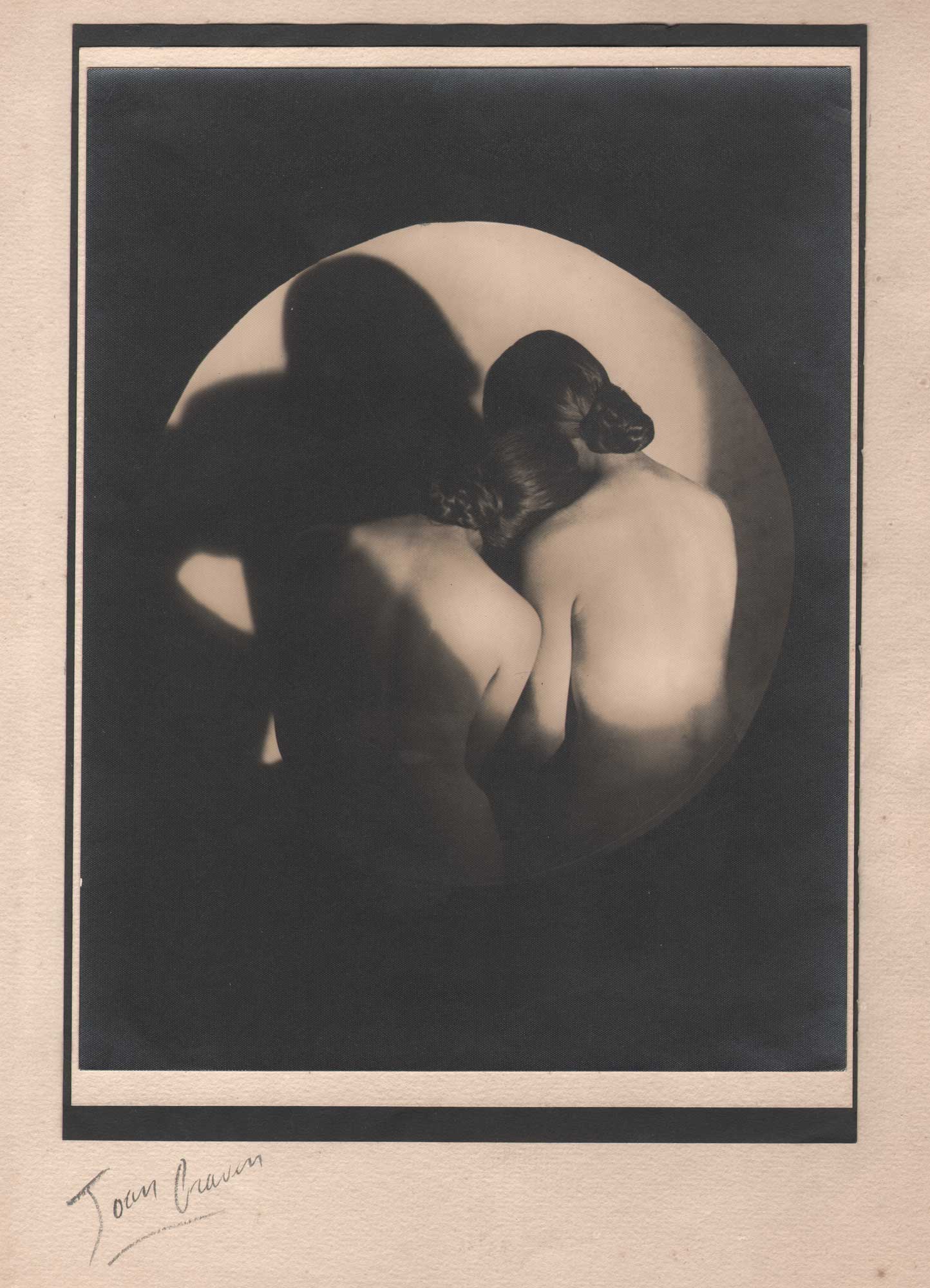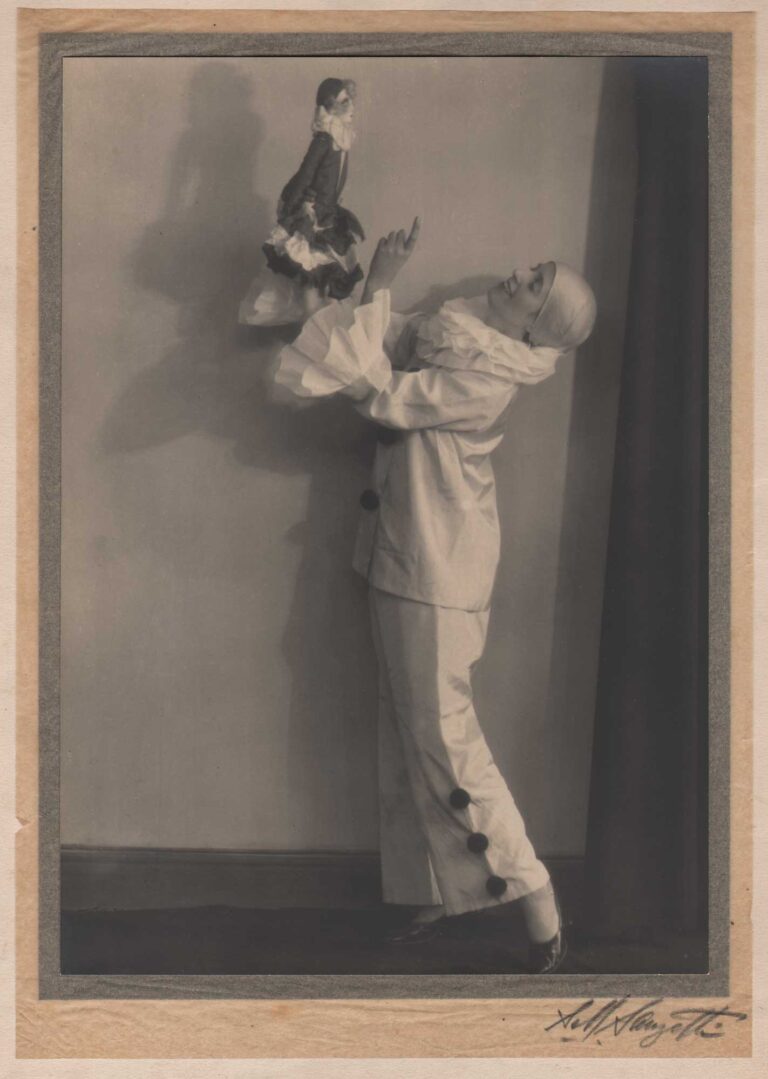
Nude Shadow Figure Study: Andrea Mijinska
This striking and very modern figural nude shadow study is believed to feature the English? fashion and artists model Andrea Mijinska. Two separate poses of Mijinska are combined by Craven for this photograph. This may have been carefully done by the photographer in-camera: turning off the main exposure light in a darkened studio and having the model rearrange herself, or perhaps more realistically, printing the work from two separate masked negatives in her wet darkroom. The giveaway it is the same model is her braided, bobbed hair. The photographer is known for her much later nudes done in the 1950s so it is remarkable to see her much earlier attempt her. The photograph was purchased by this archive from a dealer in Chile, in South America, who stated: “I bought this collection, and more fotos, of Andrea Mijinska here in Chile from a relative of the family who settled here.”
Andrea Mijinska was a sought-after fashion model who is known to have lived and worked in England (London) in the late 1920’s and early 1930’s. A full biography is not available, although it’s known she modeled for the American and British sculptor Sir Jacob Epstein (1880-1959) in 1926. He produced the bronze sculptures described as MLLE. MIJINSKA (Bust, hair parted center, and chignon) & Mlle Mijinska’s Hands, presented on a velvet covered plinth.
The model, often described in publications as the “famous mannequin with the perfect figure”, was also an movie actress. She is said to have appeared in the 1930 British musical crime film The Yellow Mask, although she is not listed in movie databases for any speaking role.
Besides this nude study by Joan Craven, six portraits by the photographic firm Bassano Ltd of Mijinska are in the collection of the National Portrait Gallery in London.
✻ ✻ ✻ ✻ ✻
Joan Craven: 1897-1979
Craven: was an English photographer known for her portraits, artistic studies, advertising, and nudes.
Career: Craven moved to London and trained under society photographer Dorothy Wilding, and by late 1925, had “pictured thousands of society and stage beauties.” In 1926, she opened her own studio on New Bond Street. Her early subjects included dancers, actresses and musicians, including Yvonne Arnaud, Harriet Cohen, Alexandra Danilova, Lydia Sokolova, Tamara Karsavina and Anton Dolin. She entered photographic competitions, winning the open portraiture and figure category at the International Photographic Competition held in Bath in 1927. Her work was shown in both group and solo exhibitions. Her portraits and artistic studies appeared frequently during the 1920s and 1930s in society journals such as The Sketch, Tatler, The Graphic, The Sphere and the Bystander, with The Sketch describing her as “the brilliant young society photographer whose artistic camera-studies are so well known to “Sketch” readers.” She was one of the few women photographers involved in advertising in the 1920s and 1930s, and her work was “acclaimed for its dramatic lighting and unusual compositional strategies.” Her clients included Cadbury chocolate, Condor hats, De Reszke cigarettes, Pond’s cold cream, and Pears soap. “Her advertising pictures … [were] familiar to all, and her unerring choice of the right model [was] unmistakable”.
In the 1950s and 1960s, frustrated with the restrictions of advertising, she concentrated on figure photography, specialising in female nudes. She was described as “[p]robably the most famous female exponent of figure photography today”, who “paints her subjects in gleaming highlights and crisp shadows”, and she has been named as one of the three “finest of the photographers of the female form”. During this period, she shared studios with Walter Bird at Kinocrat House on the Cromwell Road, London, and the notorious model Pamela Green posed for her. Her nude photographs gave her financial independence, appearing in publications including Men Only, Lilliput, Figure Quarterly and Modern Man. She also published articles to assist hopeful models, sitters and photographers.
Her portraits are held in the collections of the National Portrait Gallery, London, the Bibliothèque nationale de France and the Library of Congress. -Wikipedia (2025) continues…
